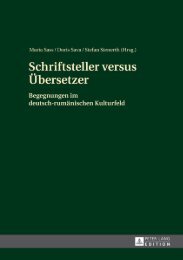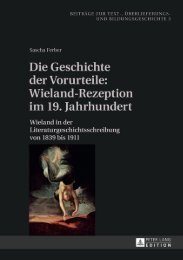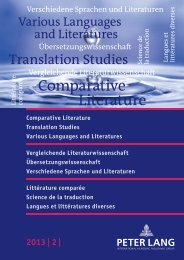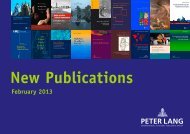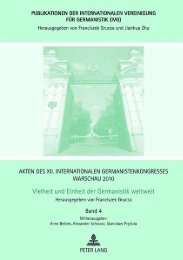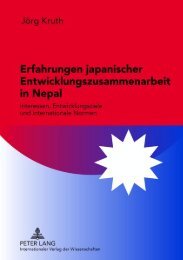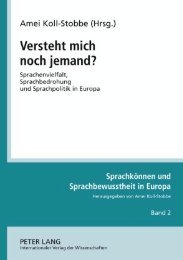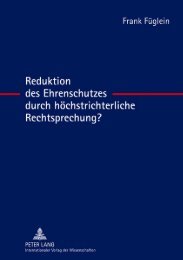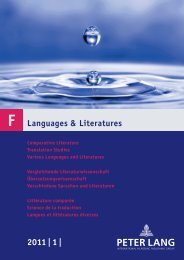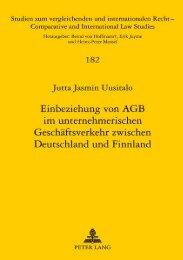Sie wollen auch ein ePaper? Erhöhen Sie die Reichweite Ihrer Titel.
YUMPU macht aus Druck-PDFs automatisch weboptimierte ePaper, die Google liebt.
gnière : Identité, nationalité et citoyenneté .<br />
Les nouveaux paradigmes de la culture poli-<br />
tique européenne • Christian Demeuré-Val-<br />
lée/Yann Fournis : De la citoyenneté euro-<br />
péenne à la citoyenneté régionale . À la re-<br />
cherche d’une citoyenneté bretonne et<br />
européenne • Mark Eyskens : Peuple ou popu-<br />
lation : le cas de la Flandre • Linda Cardinal :<br />
Quelle citoyenneté pour les minoritaires ? Une<br />
réponse néo-républicaine • Rik Pinxten : Mon-<br />
dialisation : monoculturalisme ou multicul-<br />
turalisme ? • Mark Dubrulle : Identités cultu-<br />
relles et citoyenneté dans l’élargissement de<br />
l’Union européenne • Léonce Bekemans : Le<br />
dialogue interculturel en Europe . Une réalité<br />
régionale et un devoir mondial • Koen de<br />
Wandeler/ Annette Kuhk : Bruxelles, multicul-<br />
turalité dans la capitale de l’Europe • Pedro<br />
Canavarro : La Méditerranée, espace révéla-<br />
teur de l’identité européenne • Mark Van de<br />
Voorde : L’Europe : héritage et communauté .<br />
«The book stands out as an original work that<br />
is a herald of similar works in the future.» (Enes<br />
Kabakçı, Insight Turkey)<br />
mark duBrulle , cofondateur et actuel-<br />
lement Président du Forum Europe des<br />
Cultures, a été, dans les années 1980, membre<br />
du conseil du Centre européen de la culture<br />
(Genève) . Il a publié de nombreux articles sur<br />
le fédéralisme, l’Europe, l’environnement, la<br />
communication et la culture . Il est le rédacteur<br />
et co-auteur de Future European Environmental<br />
Legislation and Subsidiarity (PIE, 1992)<br />
et de Régionalisme, Fédéralisme, Écologisme :<br />
de nouvelles bases culturelles et économiques<br />
pour l’union de l’Europe (PIE, 1995) .<br />
gaBriel Fragnière , ancien Recteur du<br />
Collège d’Europe de Bruges, Président fondateur<br />
du Forum Europe des Cultures, assume<br />
actuellement la direction de plusieurs collections<br />
d’ouvrages chez PIE <strong>Peter</strong> <strong>Lang</strong>, dans les<br />
domaines de l’histoire de la construction européenne,<br />
de l’étude des religions, de la philosophie<br />
politique et de la diversité culturelle .<br />
Parmi ses derniers ouvrages on retiendra : La<br />
religion et le Pouvoir. La chrétienté, l’Occident<br />
et la démocratie (PIE <strong>Peter</strong> <strong>Lang</strong>, 2005) .<br />
C<br />
Johan Lagerkvist<br />
hina has lived with the Internet for<br />
nearly two decades . Will increased Internet<br />
use, with new possibilities to share information<br />
and discuss news and politics, lead<br />
to democracy, or will it to the contrary sustain<br />
a nationalist supported authoritarianism<br />
that may eventually contest the global<br />
information order?<br />
This book takes stock of the ongoing tug<br />
of war between state power and civil society<br />
on and off the Internet, a phenomenon that<br />
is fast becoming the centerpiece in the Chinese<br />
Communist Party’s struggle to stay in<br />
power indefinitely . It interrogates the dynamics<br />
of this enduring contestation, before democracy,<br />
by following how Chinese society<br />
travels from getting access to the Internet to<br />
our time having the world’s largest Internet<br />
population . Pursuing the rationale of Internet<br />
regulation, the rise of the Chinese blogosphere<br />
and citizen journalism, Internet irony,<br />
online propaganda, the relation between state<br />
and popular nationalism, and finally the role<br />
of social media to bring about China’s democratization,<br />
this book offers a fresh and provocative<br />
perspective on the arguable role of<br />
media technologies in the process of democratization,<br />
by applying social norm theory to<br />
illuminate the competition between the Partystate<br />
norm and the youth/subaltern norm in<br />
Chinese media and society .<br />
«Insightful and timely, this book offers a rich<br />
analysis that brings the scholarship on Internet<br />
and democracy in China to a new level of<br />
holistic understanding. Drawing from solid<br />
empirical data and key historical knowledge,<br />
Dr. Lagerkvist connects classic political theory<br />
with China’s complex social reality, challenging<br />
conventional wisdom about Chinese authorities,<br />
political culture, and media system<br />
reform. Anyone interested in China’s media<br />
landscape and her democratic future should<br />
read this book.» (Jack Linchuan Qiu, Ph.D. Associate<br />
Professor, School of Journalism and<br />
Communication, The Chinese University of<br />
Hong Kong)<br />
Politique · Politik · Politics<br />
After the Internet, Before Democracy<br />
Competing Norms in Chinese Media and Society<br />
Bern, Berlin, Bruxelles, Frankfurt am Main, New York, Oxford, Wien, 2010 .<br />
325 pp ., num . tables and graphs<br />
pb . ISBN 978-3-0343-0435-1<br />
CHF 83 .– / € D 63 .50 / € A 65 .20 / € 59 .30 / £ 53 .– / US-$ 88 .95<br />
eBook ISBN 978-3-0351-0109-6<br />
«Johan Lagerkvist has produced the most comprehensive<br />
treatment of the internet in China<br />
we’ve yet seen. He examines topics as varied<br />
as state regulation, blogging, citizen journalism<br />
and online irony and nationalism, and<br />
links careful empirical research to evolving<br />
state, societal and business norms and the<br />
character of China’s regime. A welcome addition<br />
to a fast-growing literature, this book is<br />
a must-read for anyone interested in the mass<br />
media and political communication in China.»<br />
(Kevin J. O’Brien, Alann P. Bedford Professor<br />
of Asian Studies and Political Science, University<br />
of California, Berkeley)<br />
«After the Internet provides an authoritative<br />
guide to the huge, cantankerous, controlled,<br />
unruly, ever-surprising world of over 400 million<br />
Internet users in China. From the Chinese<br />
blogosphere to government efforts to impose<br />
harmony, from Party ideotainment to irrepressible<br />
spoofing (egao) and the political irreverence<br />
of the «grass mud horse» phenomenon,<br />
to the shapes of government vs. popular<br />
nationalism, and even the recent Google<br />
imbroglio, Lagervist gives an insightful account<br />
based on wide-ranging research and intelligent<br />
engagement with current scholarship.<br />
This will be the standard guide to understanding<br />
the Chinese Internet for years to<br />
come.» (Timothy Cheek, Institute of Asian Research,<br />
University of British Columbia)<br />
«(...) Johan Lagerkvist should be congratulated<br />
on producing this comprehensive and useful<br />
analysis of China’s Internet landscape. This<br />
timely book addresses the wide range of critical<br />
issues pertaining to the democratic implications<br />
of Internet development in China, and<br />
deserves to be widely read by anyone concerned<br />
about changes in Chinese politics, society,<br />
and culture today.» (Joseph Tse-Hei Lee,<br />
International Journal of China Studies)<br />
Johan lagerkvist holds a PhD in Chinese<br />
from Lund University . He is a senior research<br />
fellow at the Swedish Institute of International<br />
Affairs in Stockholm .<br />
Our complete backlist is available at www.peterlang.com<br />
43



